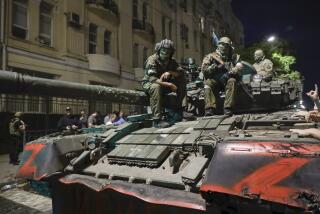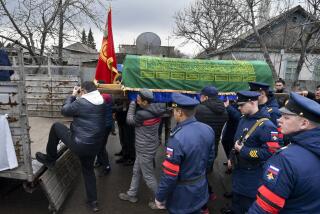In a mountain haven, Kurdish rebels wait
- Share via
MARDU, IRAQ — It is a land of resistance, the mountain peaks and winding valleys where Iraq’s Kurds battled Saddam Hussein for decades. Now another generation of guerrillas is bunkered down waving the flag of Kurdish nationalism in the Qandil mountains, this time in a fight against Turkey.
Iraqi Kurds and members of the Turkish separatist Kurdistan Workers Party, or PKK, live together in this vast mountain range that straddles Iraq, Turkey and Iran. The haven provided to the Turkish Kurd rebels here infuriates the Turkish government in Ankara, which has been locked in an intense conflict with the Kurdish separatist movement that has cost thousands of lives since the 1980s.
With as many as 100,000 Turkish troops poised to march across the Iraqi border to attack PKK camps, a military response to a rebel ambush in southern Turkey last week that killed 12 soldiers, Iraqi Kurds may now pay a steep price for ignoring the problems caused by the PKK presence in the north.
“Iraqi Kurds generally sympathize with PKK fighters. It is a force that has been demanding and fighting for the rights of Kurds in Turkey for tens of years now, and the Turks have been very harsh to their Kurdish community by forbidding them from rights,” said Asso Hardi, editor-in-chief of Awena, an independent newspaper in the city of Sulaymaniya in Iraq’s semiautonomous Kurdistan region. “On the other hand, many Iraqi Kurds view the PKK as an entity . . . which has caused many problems to the relatively stable Kurdistan area of Iraq, especially with neighboring countries.”
Up a winding series of switchbacks lies Mardu village, northeast of Sulaymaniya. Kurdish farmers tend livestock and harvest peaches, apples and grapes. A few houses among dotted oak trees serve as a makeshift headquarters for the PKK. Male and female fighters, dressed in traditional billowing shalwar pants and olive combat tops, walk freely. Local Iraqis openly support them, and some Iraqi Kurds have left city life and their families to become soldiers with the Turkish Kurd rebels and their Iranian sister movement, Party for Free Life In Kurdistan, or PEJAK.
The villagers toast the guerrillas as champions of Kurdish rights. They say they are willing to endure sacrifices as the price of their association with a movement fighting to establish Kurdish self-rule in Turkey and Iran, where they believe their minority’s basic privileges are denied.
“Three times I lost my house but I never scorned the Kurdish movement. The PKK and PEJAK have been in our village for years,” said farmer Mohammed Wasso, 64, whose property was destroyed during the Iraqi Kurds’ hard-fought war against Hussein’s forces.
Some describe the PKK as a vital trading partner and protector in a lawless area. Hussein Rashid, 45, regularly hauls gasoline and kerosene from Iran to sell to the guerrillas. He warned, “If the PKK is not here, then this will be a place for terrorism and Iran will send Ansar al Islam,” a Sunni extremist group with links to Al Qaeda.
Shereen Sulaiman, 39, a mother of three, worried about what Turkey might do to the PKK. The rebel fighters “respect the people and serve the area. They even supply the area with electricity. I don’t want them to be hurt,” said Sulaiman, wearing a red dress with her hair covered by a black veil. “They are Kurds like us.”
Kurds speak a distinct language and have a separate culture from that of Turks, Persians and Arabs. They are believed to be the world’s largest ethnic group without a state, with a total population estimated at 25 million to 40 million.
During the 20th century, Kurds were embroiled in bloody conflicts against governments in Turkey, Iraq, Syria and Iran, countries that at times have destroyed Kurdish villages and executed Kurdish political activists accused of treason. Hussein’s forces slaughtered tens of thousands of Kurds to quell a rebellion in the 1980s.
In the Qandil mountains Thursday, PKK fighters from Syria, Turkey and Iran stood in their green combat fatigues by a well, busy washing their clothes. Others cleaned rifles with rags and brushes. They had hiked across the mountains for two or three days of classes on the party’s ideology.
Diyar Swirani, a blue-eyed, pale and thin 25-year-old, was one of the fighters. He had opted for the spartan life in the mountains, working to liberate southeastern Turkey for the Kurds, instead of staying at home with his family in Sulaymaniya.
“When I see Kurdistan at the mercy of the enemy’s weapon, we must move if we love Kurdistan and call it a country of the Kurds,” Swirani said, holding some flowers he had picked in the mountains. He left his home in Iraq three years ago.
He was casting about after graduating from secondary school when he started reading Kurdish nationalist literature, and PKK founder Abdullah Ocalan seized his imagination. His uncle had friends who had fought for the PKK, and he approached them, asking how he could meet fighters with the group.
They told him to drive to the Qandil mountains, past the last of the Kurdish government checkpoints into the remote terrain that no government controls. His parents argued that he should go to university, but he ignored them and left without saying goodbye.
He drove to the guerrilla checkpoints marking the territory under nominal PKK control. At first the fighters questioned him -- to determine if he was a spy for the two main Iraqi Kurdish parties, which control Sulaymaniya, Irbil and Dahuk. The PKK fought bitterly with the Patriotic Union of Kurdistan and the Democratic Kurdistan Party in the 1990s, but since 2000 they had been left alone.
When Swirani answered their questions satisfactorily, the PKK let him stay. He entered a rigorous six-month training period, which included political and social studies in Kurdish history and leftist ideology. War training started at the crack of dawn. Trainees had to run the Qandil’s valleys and mountainsides. They were drilled through evening on how to handle a gun and respond under enemy fire.
Eventually Swirani wrote to his parents, letting them know he was well and inviting them to visit.
His main fighting experience came one year ago, when he joined a 10-man PKK squad crossing into Turkey to launch ambushes on military convoys. The two sides traded fire for an hour before the PKK fighters, outnumbered, dashed for cover and made their way back to Iraq.
Asked about Turkey’s threat to crush PKK camps in Iraq, Swirani said: “We are ready to defend the mountains. . . . It must be protected against the Turkish-Arab nationalists.”
Swirani’s squad leader stood nearby: Sheera Kurdistani from Iraqi Kurdistan’s Zakho region. She joined the PKK when she was 19, mesmerized by the stories from PKK fighters who sought refuge in her village. At 33, she is a hardened veteran in dusty fatigues, slinging a rifle, her face leathery and her hair pinned tightly in a bun. She supervises a roadside checkpoint.
She expresses no regret over her sacrifices to the PKK. “We have given up our personal lives until we become martyrs or we have reached our aims.”
--
Times staff writers Ned Parker, Raheem Salman, Salar Jaff and Said Rifai contributed to this report.
More to Read
Sign up for Essential California
The most important California stories and recommendations in your inbox every morning.
You may occasionally receive promotional content from the Los Angeles Times.










